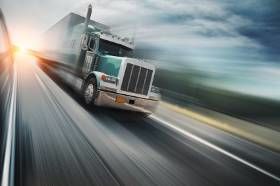Day Runner?
Topic 23083 | Page 1
I would highly recommend Old Dominion, I run linehaul for them pay starts at .55 cpm bad thing would be working nights for years until a day spot opens up. Our P&D drivers make $25 per hour to start and go up from there their days generally aren't too long I think our guys are normally done in about 10 hours but that can vary depending upon freight needs. If your trying to start a family that may be your best option as the hours are more during the daytime.
P&D:
Pickup & Delivery
Local drivers that stay around their area, usually within 100 mile radius of a terminal, picking up and delivering loads.
LTL (Less Than Truckload) carriers for instance will have Linehaul drivers and P&D drivers. The P&D drivers will deliver loads locally from the terminal and pick up loads returning to the terminal. Linehaul drivers will then run truckloads from terminal to terminal.
Linehaul:
Linehaul drivers will normally run loads from terminal to terminal for LTL (Less than Truckload) companies.
LTL (Less Than Truckload) carriers will have Linehaul drivers and P&D drivers. The P&D drivers will deliver loads locally from the terminal and pick up loads returning them to the terminal. Linehaul drivers will then run truckloads from terminal to terminal.CPM:
Cents Per Mile
Drivers are often paid by the mile and it's given in cents per mile, or cpm.

This is an old post, but I'd like to add my input. Bobcat Bob is right about what he's suggested and it would be a great path. But I want to expand on it and say that any LTL job would be equally as good, some moreso and and less so.
I found that working as a line haul driver and starting a family was a great mix and I was able to be home with the kids during the day when my wife (at the time) was at work. I was fortunate that I was able to bid a run that rarely went over eight hours and that creatively helped. But don't discount the benefits of working nights.
Almost all the LTL line haul jobs will get you home every day, but a few will want to keep you out all week so ask when you're being interviewed.
LTL:
Less Than Truckload
Refers to carriers that make a lot of smaller pickups and deliveries for multiple customers as opposed to hauling one big load of freight for one customer. This type of hauling is normally done by companies with terminals scattered throughout the country where freight is sorted before being moved on to its destination.
LTL carriers include:
- FedEx Freight
- Con-way
- YRC Freight
- UPS
- Old Dominion
- Estes
- Yellow-Roadway
- ABF Freight
- R+L Carrier
Line Haul:
Linehaul drivers will normally run loads from terminal to terminal for LTL (Less than Truckload) companies.
LTL (Less Than Truckload) carriers will have Linehaul drivers and P&D drivers. The P&D drivers will deliver loads locally from the terminal and pick up loads returning them to the terminal. Linehaul drivers will then run truckloads from terminal to terminal.New Reply:
New! Check out our help videos for a better understanding of our forum features

















Preview:
This topic has the following tags:
Home Time Local CDL Drivers Trucker's Family Matters







 TT On Facebook
TT On Facebook
Hello,
I've had my CDL for almost two years now, for the most part I enjoy the job (clearly there's been a few shippers or receivers that had challenging docking areas which I didn't care for) but I want to be home more. My wife and I are thinking about having a baby and starting a family together and I really want to be a part of the child's life so I was thinking about giving up over the load and going for something local that would have me home everyday. I live in a pretty small town and I don't think there's much call for day runners in the area so we'll likely have to move. I guess I'm wondering if anyone knows any good companies that might be looking for day runners, do they pay less, what kind of hours do they normally work. Trucking wise I've never done anything but over the road and I'm not sure how different a day cabber will be. I've also been told to look for oil field work driving their tankers or going up and driving coal trucks, anyone know much about that? Sorry this isn't the most organized post, I'm not sure how to phrase it, I guess I'm just putting feelings out and trying to get information.
CDL:
Commercial Driver's License (CDL)
A CDL is required to drive any of the following vehicles:
Shipper:
The customer who is shipping the freight. This is where the driver will pick up a load and then deliver it to the receiver or consignee.
Over The Road:
Over The Road
OTR driving normally means you'll be hauling freight to various customers throughout your company's hauling region. It often entails being gone from home for two to three weeks at a time.
Day Cab:
A tractor which does not have a sleeper berth attached to it. Normally used for local routes where drivers go home every night.